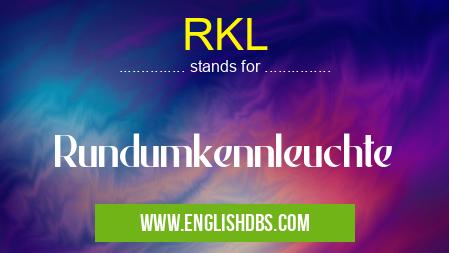What does RKL mean in GERMAN
RKL or Rundumkennleuchte is a German acronym that stands for "Rotating Warning Light". It is commonly used in various industries and applications to indicate hazards, emergencies, or special situations.

RKL meaning in German in International
RKL mostly used in an acronym German in Category International that means Rundumkennleuchte
Shorthand: RKL,
Full Form: Rundumkennleuchte
For more information of "Rundumkennleuchte", see the section below.
» International » German
Types of RKLs
- Vehicle-Mounted RKLs: Attached to vehicles such as police cars, fire engines, and ambulances to alert other drivers and pedestrians of their presence and potential hazards.
- Airport RKLs: Installed on runways and taxiways to guide aircraft during low visibility conditions.
- Industrial RKLs: Used in factories, warehouses, and construction sites to mark hazardous areas, moving machinery, or emergency exits.
Functions of RKLs
- Alerting: Emits a bright and distinctive flashing light to attract attention and warn of potential dangers.
- Guidance: Assists in guiding vehicles, aircraft, or personnel in low-light or hazardous conditions.
- Identification: Helps identify emergency vehicles, construction zones, or other important locations.
- Hazard Marking: Indicates areas where potential hazards exist, such as electrical equipment, moving machinery, or chemical spills.
Advantages of RKLs
- High Visibility: Emits a powerful light that can be seen from a distance in various lighting conditions.
- 360-Degree Visibility: Rotates to provide all-around visibility, ensuring it can be seen from any direction.
- Durability: Designed to withstand harsh weather conditions and impact.
- Easy Installation: Can be mounted on vehicles, buildings, or other surfaces with minimal effort.
Essential Questions and Answers on Rundumkennleuchte in "INTERNATIONAL»GERMAN"
What is a Rundumkennleuchte (RKL)?
A Rundumkennleuchte (RKL) is a type of rotating beacon light commonly used in Europe. It is designed to provide a highly visible warning signal and is typically mounted on top of emergency vehicles, construction equipment, and other vehicles that require additional visibility.
What are the different types of RKLs?
RKLs come in various types and sizes, each with specific characteristics. Some common types include:
- LED RKLs: These use energy-efficient LED bulbs and offer high visibility and durability.
- Xenon RKLs: These use high-intensity xenon bulbs for maximum visibility and penetration, making them suitable for long-range applications.
- Halogen RKLs: These use halogen bulbs and offer a balance of visibility and cost-effectiveness.
What are the advantages of using an RKL?
RKLs offer several advantages:
- High visibility: They provide a clear and attention-grabbing warning signal, making them effective in a variety of situations.
- Durability: RKLs are designed to withstand harsh conditions and provide reliable operation in extreme environments.
- Versatility: They can be mounted on various vehicles and equipment, making them suitable for a wide range of applications.
What are the regulations for using RKLs?
The use of RKLs is typically regulated by national or regional authorities. These regulations may vary depending on the location and application. It is important to follow the specific regulations applicable to your jurisdiction.
How do I choose the right RKL for my application?
Choosing the right RKL depends on factors such as:
- Visibility requirements: Consider the distance and conditions where the RKL will be used.
- Mounting location: Determine the size and shape of the mounting surface.
- Power requirements: Ensure the RKL is compatible with the electrical system of the vehicle or equipment.
Final Words: RKLs play a crucial role in enhancing safety and efficiency in various industries. Their bright and distinctive flashing lights effectively alert people to potential hazards, guide them in low-light conditions, and identify important locations. By adhering to international standards and adopting best practices for installation and maintenance, RKLs contribute significantly to reducing accidents and improving overall safety.
